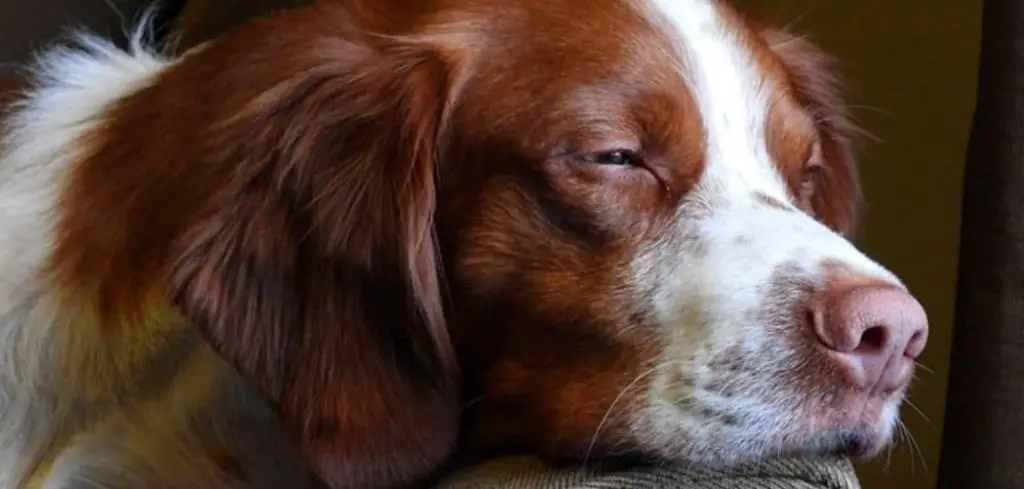Noticing your dog panting after amoxicillin can be worrying, especially if the medication was meant to make them feel better.
While some panting may be harmless, it can also signal side effects, an allergic reaction, or an underlying condition that needs prompt attention.
We outline the most common causes of a dog panting after taking amoxicillin, what you can do at home, and when to seek veterinary help.
Dog Panting After Amoxicillin — Why It Happens
Dog panting after amoxicillin can occur due to mild gastrointestinal upset, allergic reactions, fever from the underlying infection, or drug-related side effects. Some dogs may also experience panting due to stress, discomfort, or pain unrelated to the medication itself.
In rare cases, panting could indicate a serious reaction affecting the heart, lungs, or nervous system. Whether the cause is mild or severe, close monitoring is essential.

Common Causes of Dog Panting After Amoxicillin
Mild Gastrointestinal Upset
Amoxicillin can irritate a dog’s stomach, leading to discomfort, bloating, or nausea.
When dogs feel unwell, panting is a natural response to both physical discomfort and anxiety.
You might also notice drooling, lip licking, loss of appetite, or restlessness.
While mild stomach upset often improves with food or rest, persistent symptoms could require adjusting the dosage or switching medications.
Related: Dog panting excessively (Causes and What To Do)
Allergic Reaction
Some dogs are allergic to amoxicillin or other penicillin-based drugs. Allergic responses can cause swelling of the face, lips, or tongue, hives, itching, and difficulty breathing.
Panting may occur as the dog struggles to get enough oxygen or reacts to the sudden distress.
Allergic reactions can escalate quickly and become life-threatening, so prompt veterinary care is essential.
Heat or Fever From Infection
If your dog was prescribed amoxicillin for an infection, they may already have a fever.
Fighting infection raises body temperature, and panting helps release excess heat.
However, if fever persists or increases even after starting antibiotics, it could mean the infection is resistant to the medication or another complication is developing.
Pain or Discomfort From the Illness
The condition that required amoxicillin in the first place — such as a dental abscess, urinary tract infection, or skin wound — can cause pain that contributes to panting.
As the body heals, inflammation or soreness may still trigger heavy breathing.
If panting continues despite rest and treatment, your dog may need additional pain management.
Anxiety or Stress From Medication
Some dogs become anxious about taking medication, especially if they associate the process with restraint or force-feeding.
Stress can elevate heart rate and cause panting even when the medication itself isn’t directly harmful.
Dogs prone to anxiety may pant more during vet visits or shortly after receiving medication at home.
Serious Side Effects or Toxicity
Although rare, amoxicillin can cause severe side effects such as rapid heart rate, difficulty breathing, or neurologic signs like tremors and seizures.
This may occur if the dose is too high, the dog has kidney or liver disease, or there’s an unusual sensitivity to the drug.
These situations require immediate veterinary evaluation.
What to Do If Your Dog Is Panting After Amoxicillin
If your dog begins panting after taking amoxicillin, start by observing their overall behavior.
Check for other signs like swelling, vomiting, diarrhea, or lethargy. Move them to a calm, cool space and ensure they have fresh water.
Avoid giving additional doses until you’ve spoken with your vet if the reaction seems unusual.
For mild stomach upset, offering the medication with food can sometimes help.
Keep a record of when the panting starts, how long it lasts, and any other symptoms — this information can help your vet determine the cause.
When to Call or Visit Your Vet
Seek urgent veterinary care if your dog has facial swelling, difficulty breathing, pale or blue gums, collapse, or seizures.
These are signs of a severe allergic reaction or medical emergency.
Contact your vet promptly if panting is accompanied by persistent vomiting, diarrhea, weakness, refusal to eat, or worsening fever.
Even if symptoms seem mild, it’s safest to check with your vet before continuing the medication.
They may decide to switch antibiotics, adjust the dose, or recommend supportive care.
Read more: Dog Panting After Anesthesia (Here’s why)
Key Takeaway
Panting after amoxicillin can be a minor side effect or a sign of something more serious.
Watch for other symptoms, keep your dog comfortable, and involve your vet if you notice anything concerning.
Acting quickly can prevent complications and ensure your dog gets the safest, most effective treatment possible.
